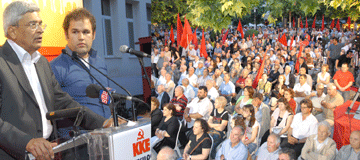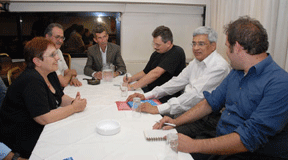 People's Democracy
People's Democracy
(Weekly
Organ of the Communist Party of India (Marxist)
No. 24
June 17, 2007
(Weekly
Organ of the Communist Party of India (Marxist)
|
Vol.
XXXI
No. 24 June 17, 2007 |
TRIP TO GREECE AND PORTUGAL
Learning About The KKE’s Work

Prakash Karat addressing the KKE rally in Larissa
Prakash Karat
I VISITED Greece from May 31 to June 2 at the invitation of the Communist Party of Greece (KKE). From there, I went to Portugal for a four-day stay at the invitation of the Portuguese Communist Party (PCP).
The KKE and the PCP are the two communist parties with whom the CPI(M) has close fraternal relations in Europe. Both these parties, though working in different conditions, have common features. They are parties based on Marxism-Leninism. Both have a glorious record of struggle against fascism – the KKE against the Nazi occupation during the Second World War and the PCP against the Salazar dictatorship which lasted nearly four decades. The two parties are firmly rooted among the working class and have a mass base in certain regions of their respective countries. The KKE and the PCP have 12 members of parliament each in their respective countries. Both the parties have withstood the “social democratisation” that many other communist parties suffered in Europe in the 1980s and 90s.
I had not been to either country before. But I was aware of the important role of these two communist parties and was, therefore, keen to go there to directly experience and understand how the KKE and the PCP were working in their respective countries in a situation where they are faced with the integrationist capitalist offensive under the European Union. I shall describe my visit and experiences in two parts – the first related to Greece and the second to Portugal.
The trip to Greece began in Athens, the capital. On May 31, the first day, I went to the headquarters of the central committee of the Communist Party of Greece for a meeting with the section for labour and trade union movement of the central committee. The team headed by Giorgos Marinos, member of the Polit Bureau, a former seaman himself, explained the situation faced by the working class. The official unemployment rate is 9 per cent, but it is, in reality, much higher. The minimum wage of 29 Euros per day and the basic pension of 450 Euros are very low. It is a tough struggle to raise wages and benefits. The working class is organised in two confederations in Greece – one for public servants and the other for the private sector, electricity and telecommunications. Since the leadership of both confederations are reformist, there is a platform created called ‘PAME’ – the All Workers Militants Front, through which the KKE cadres and other radical forces work to influence the confederations and give direction to the working class movement. PAME seeks to promote the working class demands which are in conflict with the conservative and social democratic trends. Participating in the meeting was also the general secretary of the World Federation of Trade Unions (WFTU) who reported on the developments in the international trade union movement.
This was followed by a meeting with the Athens Party Bureau. Dimitris Arvanitakis, a member of the Polit Bureau of the central committee and secretary of the Athens Party Organisation, gave an account of the work of the party in Athens city. The Athens metropolitan area has a population of 8 million which is 40 per cent of the total population. As such, it is the biggest party organisation. Of particular interest was the struggle being conducted by the party to protect public spaces and access to them. While I was in Athens, the party was conducting a struggle for people having free entry to the beaches around Athens which had been fenced off for private purposes.
Immediately after the meeting with the Athens bureau, there was a wider meeting with the cadres and activists of the Athens Party Organisation. This was a meeting convened for me to explain the situation in India and the role of the CPI(M). After I spoke, there was a discussion in which many comrades asked questions about the political situation in India, the CPI(M)’s understanding of the international situation and how we view imperialist globalisation. The discussion revealed the high level of political and ideological awareness of the cadres.
The last programme of the evening was a dinner with Eleni Mpellou, member of the Polit Bureau and head of the Ideological Commission of the central committee. She had visited India in March this year as head of a delegation of the KKE at the invitation of the CPI(M) and the CPI. The discussions at the dinner centered around the ideological issues which are of concern to the two parties particularly in the background of the dismantling of socialism in the Soviet Union and the restoration of capitalism.

Prakash Karat meeting with general secretary of KKE Aleka Papariga in Larissa
The KKE had arranged for a visit to Larissa on the second day. This is a city 280 kilometers away from Athens in central Greece. The visit to Larissa gave me an opportunity to meet with the party and trade union leadership in Larissa to acquaint myself with their activities. The party has deep roots in the region and was active in the national resistance of German occupation and then the civil war consequent to the Anglo-US intervention. A large number of cadres and supporters had sacrificed their lives in this struggle. An important aspect is the party’s work among the small and medium farmers. The KKE has one deputy in parliament from the Larissa prefecture. This deputy of parliament is also the president of Larissa Labour Centre which is a territorial organisation of all the trade unions. The problems faced by labour of low minimum wages, casualisation of jobs, unemployment, cuts in public health and education were discussed in the meeting with the Larissa Labour Centre. One of the problems faced by the workers is the theft of pension funds –– an issue which will be of great concern to the working class in India where serious efforts are being made to privatise pension funds.
The meeting with the general secretary of the central committee of the KKE, Aleka Papariga, was arranged in Larissa as she was on a tour of the province. The meeting with Papariga dealt with the current political situation in Greece where elections to parliament are expected to be held earlier than scheduled – in October this year. The KKE has been waging a consistent struggle against the rightwing government’s policies. It is also not for cooperation with the Pasok, the social democratic party, given its complete identification with the capitalist offensive and liberal policies.
The situation in Europe in the light of the French presidential elections and the consultations between the communist parties in Europe also came up for discussion. I informed the Greek leadership about the situation in India and the South Asian region and the new moves by the United States to advance its strategy in Asia.
The meeting with the general secretary was followed by a party rally at a public square in the city. I had the privilege of participating in the rally and addressing it alongwith Comrade Papariga. The rally was held by the party as a part of the pre-election build-up. The enthusiasm displayed in the rally was evident in the continuous slogan shouting by the activists of the communist youth organisation.
A feature seen both in Athens and Larissa are the young cadres who are now manning the various party responsibilities.
On the last day, a number of events were packed in. The only break in the itinerary was the visit to the Acropolis. The Parthenon and other magnificent structures in the Acropolis provided a glimpse of the ancient Greek civilisation which draws tens of thousands of tourists.
There was a meeting with migrant workers from India and Bangladesh to listen to their problems. The KKE is seriously trying to address the problems of the migrant workers. All the Indian workers who attended the meeting hailed from Punjab. One of them even belonged to the village of Harkishan Singh Surjeet and had got elected to a local trade union committee.
A visit to the Nikea municipality followed. This is one of the 16 municipalities in the Piraeus district adjoining Athens which has the port and shipyard. The Nikea municipality has the sole communist Mayor. It has a population of 140,000. It has a Left tradition and was the centre of a strong anti-fascist resistance. The meeting with the mayor of Nikea showed the problems faced by the municipalities. The municipalities are suffering from lack of funds from the government. The central government is passing on the burden of running the schools and child care centres on to the municipalities without providing them with sufficient funds. This is part of the overall plan to privatise basic services.
The last event was the visit to the shipyard. I had a meeting with the leaders of the five trade unions in the ship building yard. The EU directives have destroyed the ship building work of this enterprise. It now survives solely on ship repairing. The workers have waged a heroic fight to save the shipyard and by their determined struggle have won a favourable agreement. The highlight of the evening was seeing the exhibition of visual and plastic arts being held in the shipyard. This was organised by a group of artists and the trade unions with the themes inspired by the life and work of the shipyard workers to paintings, sculptures and installation art. The exhibition was a splendid and moving depiction of the life and struggle of the working class. It was a fitting finale to a trip in which most of the events were centred around the working class movement and its party.
All through the trip, Babis Angourakis and other comrades of the International Department ensured that I had the maximum opportunities to acquaint myself with the KKE’s activities and the state of the working class movement.